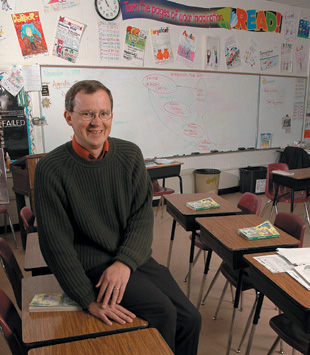

A publication of The Graduate School, University of North Carolina at Chapel Hill
On-Line Version Spring 2005
Home | Back issues | About us | The Graduate School | UNC-Chapel Hill | Make a gift
Doing the Numbers
Royster Fellows rethink math education
 |
| Royster Fellow Mark Ellis, a doctoral candidate in education, is working with a team of graduate students to discover better ways for middle school teachers to convey math skills to students. |
Math: some students love it, some students hate it.
Either way, it’s a key component to students’ success in school. Always a part of college entrance exams and placement tests, math skills help open doors for students that might otherwise be closed.
But while some students pick up math skills with few problems, many others are turned off by its seemingly complicated procedures. In the midst of national debates over school standards and how children should be taught, two Royster fellows are finding ways to help children better learn the math skills necessary for success.
Mark Ellis, a doctoral student in education, has been working with the Mathematics IDentity Development and LEarning (MIDDLE) project for the past two years. As project director for the three-year study, he has helped observe and interview teachers and students in more than 60 North Carolina middle school classrooms, helping pin down the teaching methods that best help students learn math.
“Middle school is a point where a lot of students start to lose interest and harden their opinions about math,” said Ellis, who taught middle and high school math for six years before coming to Carolina.
Now writing his dissertation with support from the Caroline H. and Thomas S. Royster Fellowship, Ellis helps coordinate the team of math education graduate students collecting data for the NSF-funded study, now in its final year of data collection. In addition to observing teaching methods and surveying students, each year the team chooses several classrooms to observe more closely, interviewing students and teachers in depth.
“We wanted to get into the students’ thinking and find out how they are applying mathematical concepts to solve problems,” Ellis said. “Learning mathematics is about understanding why we use a procedure so it takes on more meaning for students than just a means to an end.”
Teaching methods that let students talk among themselves to solve problems appear to promote students’ confidence, Ellis said. And small, facilitated groups where students challenge each others’ ideas can encourage positive attitudes and a sense of belonging in a math classroom.
 |
| Royster Fellow Tom Munk is studying the many different factors that impact students’ success with math. |
While Ellis has been studying math education at ground level, fellow education graduate student and Royster fellow Tom Munk is looking at broader issues that impact students’ success with math. Studying data gathered by the federal Department of Education, Munk is deciphering which factors most affect students’ achievement on standardized math tests.
Using data on eighth graders who took the National Assessment of Education Progress math tests, Munk analyzed the data and organized those variables affecting success into four categories: students’ home environments, their schools, their classrooms and themselves.
“My theory is that each
of these factors relates to students’ math scores directly and indirectly,”
Munk said. “I expect to provide evidence that these factors relate
in such a way that, taken as a whole, our educational system gives the
least effective education to the groups of students who are farthest from
mathematical proficiency and the most effective educational opportunities
to those who need it the least.
“There’s a national debate right now on ‘closing the
gap’ in student achievement, and the debate focuses on schools,”
Munk said. “I’m trying to say that the picture’s a whole
lot bigger.”
Both Munk and Ellis said they have had more time to focus on the big picture of math education research because of the support given by the Royster Fellowships.
“Having the Royster Fellowship has been very important to me,” Munk said. “It’s helped me focus on my research in a way that wouldn’t have been possible otherwise.”
Munk and Ellis hope their work started at Carolina continues after they graduate as they help future educators learn better ways to teach students math.
- Grace Camblos
© 2003, The Graduate School, The University of
North Carolina at Chapel Hill
All text and images are property of The Graduate School
at the University of North Carolina-Chapel Hill. Contact Sandra Hoeflich
at shoeflic@email.unc.edu
to request permission for reproduction.